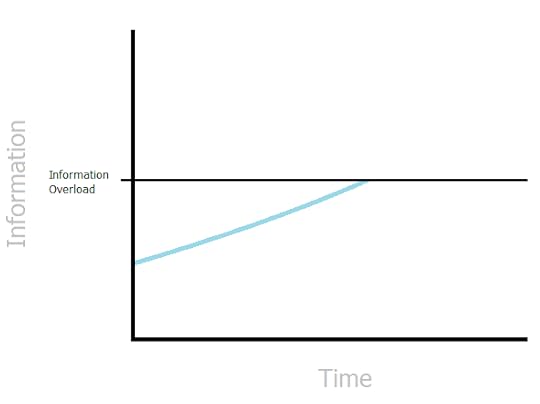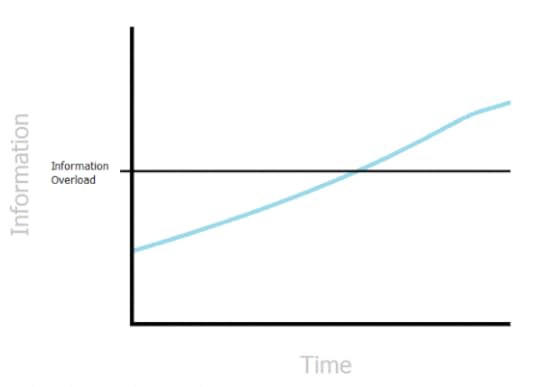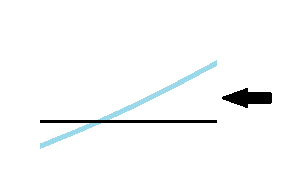Scott Berkun's Blog, page 75
January 5, 2011
Does information overload matter?
Recently I've been involved in quantity vs. quality arguments related to the web. I have a half-baked thought I wanted to share, in hopes someone else already has baked it. Or can now.
In this simple chart, we see someone's information consumption. At some point, they are aware of so many websites, blogs, tv shows, etc. that they feel personally overwhelmed.
The amount of content in the world is always growing, as is our awareness of information made before we were born. Therefore the possible information a person could consume continues to increase over time and is well beyond a person's individual capacity to ever read, see, think or even know about it all.

The question then is this: Does the space beyond a person's point of information overload matter? Since it's beyond their threshold (they are already overloaded), does it matter if there are 5, 10, 100 or 1000 other blogs or books to read? Or if 5, 10, or 10,000 new blogs or books are made?

If information overload is a constant, we're indifferent to whatever is beyond that constant since we don't experience it any differently than the overload we already have.
There is a notion the world is polluted with information. And that reckless publishing or creation is bad. This might be true, but that ship has sailed. We won't be eliminating information from the world. Therefore:
Hypothesis: It doesn't make the world any worse to add more information to it, since we can't be/feel more overloaded than we already do.
What do you think? Opinions? Flaws? Improvements? Has someone else written about this before?
Related posts:Obama vs the iPad (information overload)
IDEA 2006 Conference, Seattle, Oct 23/24
How Private are Facebook Executives?
Good advice from top bloggers
How do you grow willpower?
Munich advice?
I'll be speaking at OOP 2011 in Munich, Germany late this month. I've never been to Munich before, or Germany for that matter.
Any advice or recommendations, dear readers? I'd be grateful for suggestions.
If you're a local, or a fan in town for the conference, let me know – maybe we can meet for a beer (or 6).
I've never been asked to do that before. Are you having a hard time finding speakers?
Related posts:Stupid things presenters do (and how to stop them)
Why conferences have bad speakers
London: meetup for a pint this week?
Why you should go to the GEL '08 conference
Speaking in Portland Thursday
Quote of the week
"If we only wanted to be happy, it would be easy; but we want to be happer than other people, and that's almost always difficult, since we think them happier than they are."
- Charles de Secondat
Related posts:Quote of the day
Quote of the week
In Love with Pandora: Music recommendations
quote of the week
Quote of the week
January 4, 2011
Great talk: How to Solve a song
Here's my favorite talk from last month's Seattle Ignite 12 – How to Solve a Song, by Karen Cheng.
The video doesn't do it justice – which happens sometimes (any theories? leave in the comments).
Not sure if it's that the audience energy isn't picked up well in her microphone, or what, but this was awesome to see live. If you get bored, jump to the medley around the 3 minute mark:
Related posts:How to speak to a bored audience
Attention and Sex: 5 minute video
Seattle Ignite #12: the recap
The challenge of visible twitter at conferences
Help me find photos for the new book
January 3, 2011
Twitter vs. Deep reading?
Clive Thompson wrote in Wired about how he thinks twitter fuels in-depth analysis. I have doubts about his argument, but perhaps agree with his main point. Here's an excerpt:
When something newsworthy happens today—Brett Favre losing to the Jets, news of a new iPhone, a Brazilian election runoff—you get a sudden blizzard of status updates. These are just short takes, and they're often half-baked or gossipy and may not even be entirely true. But that's OK; they're not intended to be carefully constructed…
…It used to be that only traditional media, like magazines or documentaries or books, delivered the long take. But now, some of the most in-depth stuff I read comes from academics or businesspeople penning big blog essays…
Here's my opinion:
Most people are still not on twitter, so twitter has had no effect on their reading behavior.
Facebook might be a better place to study, as status updates are the mainstream (can we call Facebook mainstream yet?) equivalent of tweets.
There will always be a wide variety of different writing forms and lengths that succeed simultaneously.
Media trends are not universal. For some people twitter has crushed interest in long form, but in others it's helped them find long things to read. The broad stroke is too abstract to have a meaningful argument about.
Twitter has replaced newsreaders for many early-adopters (most people on earth don't use newsreaders either) and it serves the same purpose. It's how they find longer things to read.
Twitter doesn't persist well. It's very hard to link to a twitter conversation and have it be readable.
Email is still a huge source of reading material discovery and consumption, but is consistently glossed over, despite it being nearly 30 years old.
I agree with Thompson's last point. The kindle and i-pad have improved long form reading, in out attention deficit culture. It's a dedicated, read-only designed experience. I now read longer articles found online via Kindle, and find I'm reading more of them, but often days or weeks after they were published.
If you use twitter, has twitter changed your reading habits? And if you don't use twitter, has it's existence changed how the people you read do their writing?
Related posts:Berkun fan page: now up on facebook
Twitter reconsidered
Are we reading less or more? (WSJ)
Looking for a word for…
My books are now on Kindle
December 29, 2010
Looking for a word for…
I posted on twitter yesterday looking for a word. Here's what I wrote:
I need a word for someone who is always very busy and doing work, but adds no value (It's a distant cousin to slacker, but a more active kind of unproduction).
Can be a real word, or made up – received about 15 suggestions:
busy body
unproductive
bureaucrat
program manager
wheel spinner
Frantic fluffer
drone
Workaholic
Troll
Frolicker
Oxygen waster
Middle manager
Busy-bee
Frantic Zero
Stacker
Seat warmer
Stationary duck
Politician
Keener
Stroker
Any other ideas, or votes, dear blog readers?
Related posts:The mystery of the front row
The manager that's never there
New essay: How to survive a bad manager
This week: you make the call
No secrets: new project management blog
December 28, 2010
The Internet changes nothing
Thanks to Ario found this provocative essay on the effect of the web, called The Internet Changes Nothing.
There is a cynical slant to this piece, which the title gives away, but much of his logic and question are sound, it's just the conclusions where he sometimes runs astray. I agree Marshall McLuhan was a lousy writer and a jumbled thinker, and technology revolutions tend to warp the idea of what a true revolution should bring. The Internet certainly has changed some things for the better, but it has had little effect on others (Are Americans happier or better educated on average than in 1994?).
Here are two choice quotes:
The Internet is not new anymore. It's twenty years old. Commercial television was roughly two decades old in 1970; it was an established medium. No one then heralded TV as a revolutionary new technology. The Internet is not maturing. It is mature. TV's programming and business models were rock solid in 1970; the new line up was always the old line up slightly modified. No one speculated seriously about any radical new broadcast TV format. Finally, the Internet has not "changed everything." TV too was supposed to "change everything." It didn't. Rather, it altered what we did with our time. Before TV, the week had an extra twenty hours. TV took them away.
The suggestion being that the Internet mostly has taken those hours back from TV. We used to write letters, now its emails. We used to talk on the phone, now we use Facebook. There is more shifting than radicalizing or revolutionizing. Is the shift a revolution? depends on which part you care about: the means or the ends.
Think for a moment about what you do on the Internet. Not what you could do, but what you actually do. You email people you know. In an effort to broaden your horizons, you could send email to strangers in, say, China, but you don't. You read the news. You could read newspapers from distant lands so as to broaden your horizons, but you usually don't. You watch videos. There are a lot of high-minded educational videos available, but you probably prefer the ones featuring, say, snoring cats.
Why we don't use the internet to the fullest is not a technological problem – it's a cultural / personal problem each of us face that technology can't solve for us. We had the same problem with typewriters and libraries. And we'll always have it. Convenience is not always the problem that needs to be solved.
As Neil Postman suggested long ago, there are many kinds of problems technologies not only can't solve, but have no effect on. If our view of life is tech-centric, we are blind to both the limited impact of technologies on those problems, and the problems themselves.
Read the essay: The Internet Changes Nothing. Worth the time to sort out where you agree and disagree with him.
Related posts:The victimization ratio
Can high quality be cheap?
Calling bullshit on social media
MLK, technology and inspiration
Obama vs the iPad (information overload)
December 27, 2010
New years resolutions that work
The Romans had new years resolutions, and I suspect they were just as bad at keeping them as we are. The problem is we create them based on wishful thinking, the worst kind of thinking there is. It's very easy to make a resolution, but much harder to keep them. We typically pick things for their emotional or ego potency, ignoring how unprepared we are to achieve them.
The desire is only one part of the challenge – even the definition of the word resolve expresses this:
re·solve:
to come to a earnest decision about; determined to do something
to separate into constituent or elementary parts
The solution is Divide and Conquer, another idea from the Romans:
Pick one resolution, or one more than you completed last year. Odds of staying focused improve.
Look at last years list and evaluate where you failed. Too ambitious? Where did you give up? Use this self-knowledge to inform this year's resolutions.
Break any resolution into monthly goals so you have short term focus.
Find a friend who can sign up to the same goal. We are social creatures, and our goals should be social.
Write down the resolution and sign it. Writing has power.
Put your written resolution somewhere useful (e.g. in front of the fridge)
Have a daily positive task – mark off a day on a calendar every day you've met your resolution. You get a positive visual reminder you're on your way.
Divide further: simply make a resolution for January, and re-evaluate on Feb 1st.
The American Psychological Association report on resolutions noted:
And while nearly 60 percent of people will drop their resolutions by the six-month mark, perhaps due to the persistence of old habits as well as reversion to earlier stages of behavior change, Norcross notes that those who make resolutions are still 10 times more likely to successfully change their behavior than those who do not.
Related posts:The meaning of new years day
Woody Guthrie's new year's resolutions
This week in pm-clinic: mystery of personal goals
This week: How to reorganize a team
Can Getting Healthy be Fun?
Experience is overrated
Experience is only a chance to learn. It does not guarantee any lessons or skills. A resume for someone who worked at a company for ten years, even a fancy one, ensures only that they learned how not to get fired. Maybe they slept with the boss, or were the low performer others kept around so they'd look good. The quantity of their experience alone promises nothing.
We make decisions about people based on our positive assumptions about their experience, denying our knowledge of experienced people in our lives who suck at what they do, despite how long they've done it. The experience of a proud parent with 5 adult children means little if they're all in prison and hate their Mom and Dad. A VP at a Fortune 500 corporation whose division succeeded in spite of their incompetence, has a deceptive track record that does not tell you the important parts of the story.
Many on this planet go through life being mediocre at most things they do – it's not a shortage of experience that's the problem. Sometimes someone who is smart, honest and motivated but has no experience at all, will perform better than someone with a superficially impressive career we can only judge from the most biased source possible: their own opinion.
Related posts:Thursday linkfest
How ideas escape their prisons
What Microsoft gets for $2 billion
Talent vs. Experience
How to fight management incompetence
December 22, 2010
Why it's ok to be obvious
I get occasional feedback that what I said or wrote was obvious. "I liked that post Scott, but it I've heard it before" or "Chapter 5 was interesting, but there's nothing new here." I've learned this can be an empty critique. Here's why:
1. Repeating a message can be necessary
It seems we still haven't learned the Ten Commandments, the First Amendment, or most of this planets basic laws and precepts. Being reminded of important ideas is necessary because:
We need to hear some things several times before we understand
We need well told reminders to put ideas into practice
We forget
Rather than worry if something is obvious or not, the better questions are:
Is the writer making good points?
Are the stories interesting?
Are they compelling?
Is there an angle or framework for that's being offered that's helpful?
Can I make use of what I'm learning?
Does this explain an obvious point in a way I can share easily with others?
Being obvious is certainly a mistake if none of the above apply, but otherwise there is value. As a writer, when I'm told a reader couldn't apply what I'd said, or the stories didn't relate to their lives, that's more useful criticism. But "that's obvious" doesn't on its own suggest I should have changed anything.
2. For some topics, being radically new and different probably means you are wrong.
A book on basic math will, at some point, explain that 2 + 2 =4. Any writing that attacks universal themes (love, happiness, progress) will cover ground others have before. The better questions are:
Does the writing provoke?
Does it motivate?
Does it inspire?
Is it convincing you to do something better for yourself or the world?
I don't believe radical new theories on innovation or public speaking are necessary. No theory will do the hard work or take the risks for you. This is perhaps my meta-theory. It explains why I'm unlikely to write a book called "The radical new amazing theory on X". I don't believe such things exist for the interesting challenges in this world, and books that claim there is one focus more on novelty than utility. Even when popular, these books have little influence relative to their sales.
Artist Nina Paley said "Don't be original; be obvious. When you state the obvious, you actually seem original… Likewise, the more specific the feelings, experiences, stories – the more universal they appear."
3. If it's old to you, it might be new to someone else
One of my favorite stories from Confessions of a Public speaker is the often quoted study on how people are more afraid of speaking to a crowd than dying (read the excerpt here). Everyone's heard this, and many believe it, but few knows the source. It was a thrill to dig up the actual research and show how empty it was. But I did have someone tell me, "I'd heard that debunking before Scott", to which I wanted to reply "but what about the 99% of the population that hasn't?"
In The Myths of Innovation, a similiar thing happened with Newton and the apple. I was stunned during research to discover how apocryphal the apple story was. I'd been reading about invention and science my whole life, and hadn't encountered that before. I figured even if more people than I realized knew about this, it was a stellar reference for making larger points about epiphany stories. Just because you might find a story obvious, doesn't mean the larger point it's being used to make isn't important, meaningful or relevant.
Ideas can be both obvious and potent, and surprising and impotent.
Related posts:How to call bullshit on a guru
How Apple got everything right
How do you teach leadership in high school?
This week in pm-clinic: Managing proof of concept
Understanding Apple (Apple now the #1 Music retailer)



